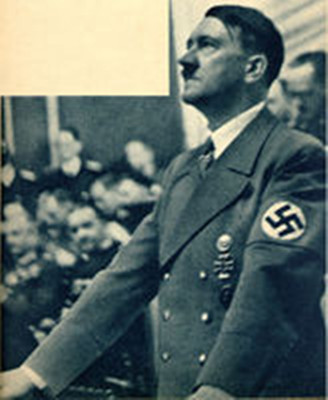For decades, circumstances forced me to talk almost exclusively of peace.
數(shù)十年來,迫于形勢,我只能談和平。
But now, he told the journalists,the news had to be presented so as to create the impression that...
但現(xiàn)在他告訴記者必須通過新聞來制造假象。
There are matters which, if they cannot be achieved by peaceful means,must be enforced by means of violence.
若一些事端不能通過和平方式解決則必須使用暴力。
What was crucial was to say to the people...
重要的是要告訴人民領(lǐng)導(dǎo)人永遠(yuǎn)是正確的...
This was now important, said Hitler,in order to free the German people from the bondage of doubt.
希特勒說,當(dāng)前這點(diǎn)尤為重要,唯有這樣,能讓德國人擺脫疑慮。
These were the scenes in Munich, in July 1939,for a celebration of German art.
這是1939年7月,慕尼黑慶祝德國藝術(shù)節(jié)的場景。
By the time these pictures were taken,Hitler had orchestrated the dismemberment of Czechoslovakia,and the British and French governments had warned Hitler that if the Germans moved on Poland, then there would be war.
慶祝期間希特勒已策劃進(jìn)軍捷克斯洛伐克,英法政府警告希特勒,若德國進(jìn)軍波蘭,勢必引發(fā)戰(zhàn)爭,德國媒體對此事的態(tài)度則大相徑庭。
The German press saw things very differently and with one voice had been telling the people that Germany was being treated unjustly.
口徑一致地向人民宣傳德國受到了不公平待遇。
That their Fuehrer's legitimate demands were simply not being met.
元首的合法要求沒得到滿足。
譯文屬可可原創(chuàng),僅供學(xué)習(xí)交流使用,未經(jīng)許可請勿轉(zhuǎn)載











